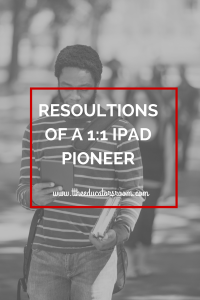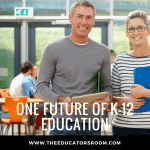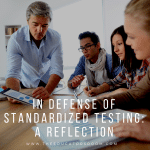 Just before the December recess a senior stopped me in the hall enthusiastic over his acceptance into college. He impressed upon me sincere gratitude for the letter of recommendation I had written. We exchanged compliments and I was given to reflection on two years we shared in history studies. In the recommendation I had highlighted his impassioned argument and subsequent research into the results of the use of the atomic bomb as evidence of academic excellence. Why had this student, usually overlooked for his average participation, risen to write an essay on par with our most advanced? I recall two factors that made a difference. Implementing literacy strategies specific to writing deficits and securing an authentic audience to assure students that their opinions mattered. An Iraq war veteran student teaching in our department and an email correspondence with a Los Alamos scientist were filling invaluable roles as listeners and conversationists. This flashback imbued me with resolutions for this next semester in 2015.
Just before the December recess a senior stopped me in the hall enthusiastic over his acceptance into college. He impressed upon me sincere gratitude for the letter of recommendation I had written. We exchanged compliments and I was given to reflection on two years we shared in history studies. In the recommendation I had highlighted his impassioned argument and subsequent research into the results of the use of the atomic bomb as evidence of academic excellence. Why had this student, usually overlooked for his average participation, risen to write an essay on par with our most advanced? I recall two factors that made a difference. Implementing literacy strategies specific to writing deficits and securing an authentic audience to assure students that their opinions mattered. An Iraq war veteran student teaching in our department and an email correspondence with a Los Alamos scientist were filling invaluable roles as listeners and conversationists. This flashback imbued me with resolutions for this next semester in 2015.
Resolution should come not from regret but from empowerment. I’m a teacher in a 1:1 iPad classroom. The one thing I can access that I couldn’t without technology is a constant authentic audience. Why should I be the one and only adult reviewing their work? Will my edits and suggestions for improvement matter more if I’m not the last stop but the gate checker before send off? Students are growing accustomed to video conferencing, Facetime, GoogleChat, and other social media tools. It takes effort on my part to set up and secure live audiences but I could begin creating incentives for students to find those mentors. Right here in Vermont our legislative House Speaker visited our school and invited students to meet with him for future group discussions. With Googlechat, we can record the forum and review it with other students interested in attending a follow up session. Inviting mentors into classrooms not only for final presentation but for the process of research is truly beneficial. I have had some luck inviting other teachers and faculty in our school to stop in and ask students what they are working on, when they hope to have their work presented, what they hope to learn along the way. Following up a face to face visit with an online viewing of the work constructs a simple framework for student progress and completion.
Audiences do not need to form close connections. I used a student debate comparatively ranking great warrior classes of history to instigate research. Completed student work was posted to a Wix site and I contacted several of my peers, nationwide, to involve their classes in reviewing our work. They in turn accessed my Google Form to participate in the ranking which we were able to view as live results. Google Form’s summative feedback, graphs the results which generated in class discussion about the historic context and the aesthetic value of presentation.
Future Audiences– I am resolved to help students take themselves seriously about what they believe, what they know and what they hope to become. Guidance counselors and program coordinators work diligently focusing students on planning for their future. Teachers can assist in this process by encouraging students to develop a comfort for publishing their own intellectual property. I’ve begun posting student projects to Twitter tagging them with our class name, the school hashtag and any other compatible tags that draw the right audience. I have also started reviewing digital portfolio tools that help students set personal information into downloadable templates for compiling and copying information to other sources. Without examples of work gathered over time, students can’t stand apart as individuals, they can’t present a timeline of progress. I went to a workshop on managing an online persona. The presenter represented the admissions office to a nearby college. Her job is to track and develop positive relations with high school students vesting an interest in the college through Twitter and other social media tools. One point stayed with me. It is better to track students who present their interests in the college and offer a portfolio worth following. Simply adding the college hashtags or handles to work that an individual is proud of creates a direct communication line to admissions who review and respond with positive feedback, keeping track of that student in the future. Similarly, Zinch an online platform geared for networking directly with colleges, scholarship opportunities draws together communities supportive of student achievements. Students should learn to control and manipulate their online image otherwise it will be done for them in ways unkind.
Simple changes should procure lasting . I hope to be less patronizing in 2015 avoiding statements like, “I’ve already explained this once, if you were listening you’d know.” or “well, it’s on the website, its up to you to find it.” I just added one class to the app Remind. Remind sends a short text message to students or parents or anyone connected. It doesn’t give teachers access to student contact information, it only sends communication through that application alone. I can send a homework reminder or a link to a classroom resource. I can send a single question survey tool for instant responses. I just discovered a new feature, voice messaging. I can offer a reiteration of a lesson, a quick positive thought and or an oral reminder of the expectations for class. No other communication is necessary. And for students who do show up to class asking questions, I can just refer them to their own voice mail and put responsibility back in their own control. “Check it and then tell me what we are hoping to accomplish.” Students who can tell me what they heard can also ask a clarifying question that gets to the heart of their confusion or apathy for whatever is assigned. I can follow this with conversations moving towards commitments for redesigning questions, research and answers that they are willing to complete. Educators have the tools to promote self reliance in the digital world. It is worth a try.




